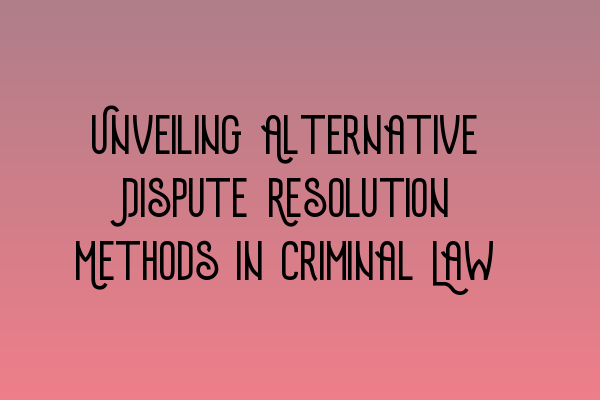Unveiling Alternative Dispute Resolution Methods in Criminal Law
As criminal law practitioners, we understand the importance of resolving legal disputes efficiently and effectively. The conventional method of resolving disputes through the court system can be time-consuming and costly. However, there are alternative dispute resolution (ADR) methods that can offer a more streamlined approach. In this article, we will explore some of the alternative dispute resolution methods available in criminal law.
Mediation
Mediation is a voluntary and confidential process that involves a neutral third party, the mediator, facilitating communication and negotiation between the parties involved in a dispute. It can be an effective method of resolving criminal law disputes, as it allows for open dialogue and the opportunity for the parties to reach a mutually agreeable solution. Mediation can be particularly useful in cases where emotions are running high, as it provides a safe and controlled environment for discussions to take place.
To learn more about mediation in criminal law disputes, check out our SQE 1 Practice Exam Questions article.
Arbitration
Arbitration is another alternative dispute resolution method commonly used in criminal law cases. Unlike mediation, arbitration involves a neutral third party, the arbitrator, who acts as a judge and makes a binding decision on the dispute. The decision of the arbitrator is final and enforceable, similar to a court judgment. Arbitration can be a faster and more cost-effective option compared to court litigation, as it avoids lengthy court proceedings.
If you’re interested in practicing arbitration in criminal law, our SQE 1 Practice Mocks FLK1 FLK2 article provides valuable insights and tips.
Restorative Justice
Restorative justice is a unique alternative dispute resolution method that focuses on repairing the harm caused by the criminal offense. It involves bringing together the victim, offender, and other affected parties to discuss the impact of the offense and find ways to make amends. Restorative justice aims to promote healing, understanding, and accountability, rather than just punishment. It can be particularly beneficial in cases where the victim seeks closure and the offender wishes to make amends.
To delve deeper into the concept of restorative justice and its application in criminal law, consider checking out our SQE 2 Preparation Courses article.
Negotiation
Negotiation is a fundamental skill in criminal law. It involves the parties involved in a dispute engaging in discussions to reach a mutually acceptable agreement. Negotiation can take place at various stages of the criminal justice process, such as during plea bargaining or in pre-trial settlement discussions. Effective negotiation skills can help criminal law practitioners advocate for their clients’ interests and potentially lead to favorable outcomes.
Our SQE 1 Preparation Courses article provides comprehensive resources to enhance your negotiation skills and prepare for the SQE exams.
Conclusion
Alternative dispute resolution methods offer valuable alternatives to traditional court litigation in criminal law cases. Mediation, arbitration, restorative justice, and negotiation can provide more efficient and cost-effective means of resolving disputes. Understanding and incorporating these alternative methods into your criminal law practice can lead to better outcomes for your clients and a more streamlined justice system.
